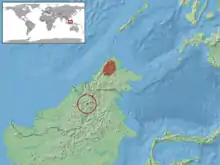| Calamaria griswoldi | |
|---|---|
| Scientific classification | |
| Domain: | Eukaryota |
| Kingdom: | Animalia |
| Phylum: | Chordata |
| Class: | Reptilia |
| Order: | Squamata |
| Suborder: | Serpentes |
| Family: | Colubridae |
| Genus: | Calamaria |
| Species: | C. griswoldi |
| Binomial name | |
| Calamaria griswoldi Loveridge, 1938 | |
 | |
| Synonyms[2] | |
Calamaria griswoldi, known commonly as the dwarf reed snake or the lined reed snake, is a species of snake in the family Colubridae. The species is native to Southeast Asia.
Etymology
The specific name, griswoldi, is in honor of American ornithologist John Augustus Griswold Jr. (1912–1991), who collected the holotype.[3]
Geographic range
Habitat
The preferred natural habitat of C. griswoldi is forest, at altitudes of 1,000–1,500 m (3,300–4,900 ft).[1]
Description
C. griswoldi is a small species. Maximum total length (including tail) is 49 cm (19 in).[2]
Reproduction
References
- 1 2 3 Iskandar, D.; Jenkins, H.; Das, I.; Auliya, M.; Inger, R.F.; Lilley, R. (2020). "Calamaria griswold ". IUCN Red List of Threatened Species. 2020: e.T191944A176109821. doi:10.2305/IUCN.UK.2020-3.RLTS.T191944A176109821.en. Retrieved 11 November 2021.
- 1 2 3 4 Species Calamaria griswoldi at The Reptile Database www.reptile-database.org.
- ↑ Beolens, Bo; Watkins, Michael; Grayson, Michael (2011). The Eponym Dictionary of Reptiles. Baltimore: Johns Hopkins University Press. xiii + 296 pp. ISBN 978-1-4214-0135-5. (Calamaria griswoldi, p. 109).
Further reading
- Das I (2012). A Naturalist's Guide to the Snakes of South-East Asia: Malaysia, Singapore, Thailand, Myanmar, Borneo, Sumatra, Java and Bali. Oxford, England: John Beaufoy Publishing. 176 pp. ISBN 978-1906780708.
- Loveridge A (1938). "New Snakes of the Genera Calamaria, Bungarus, and Trimeresurus from Mount Kinabalu, North Borneo". Proceedings of the Biological Society of Washington 51: 43–46. (Calamaria lumbricoidea griswoldi, new subspecies, pp. 43–44).
- Marx H, Inger RF (1955). "Notes on Snakes of the Genus Calamaria ". Fieldiana Zoology 37 (7): 167–209. (Calamaria griswoldi, new status, pp. 183–185).
This article is issued from Wikipedia. The text is licensed under Creative Commons - Attribution - Sharealike. Additional terms may apply for the media files.
